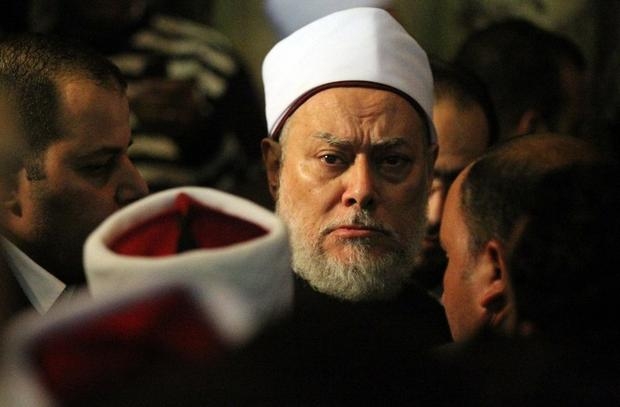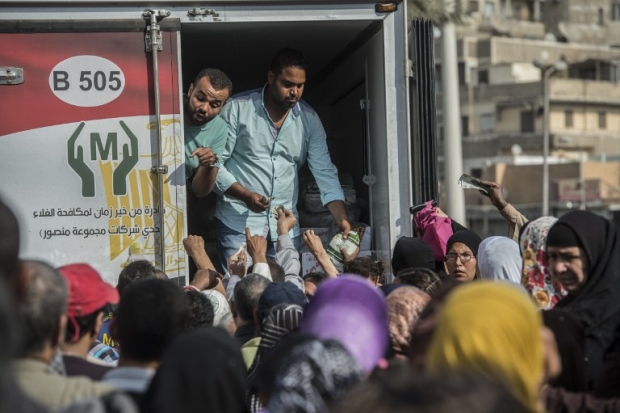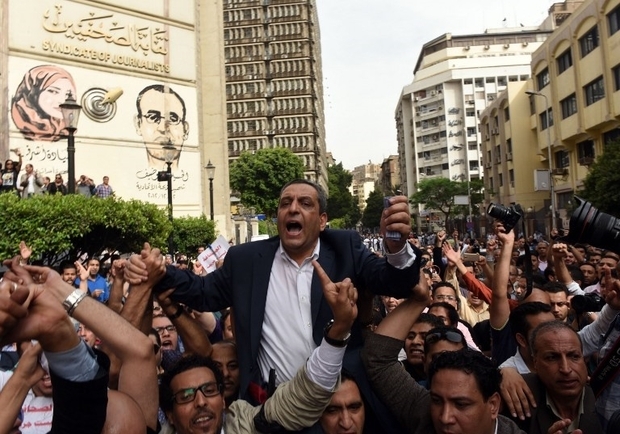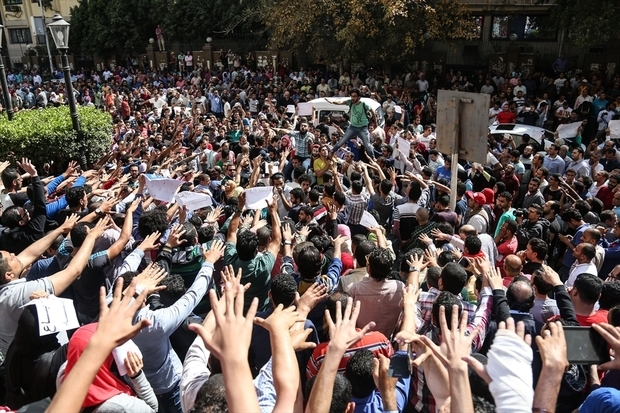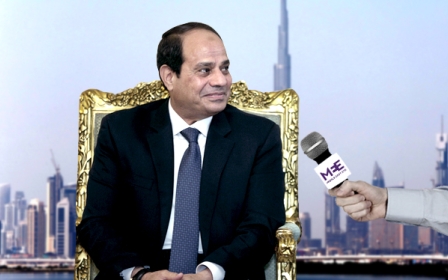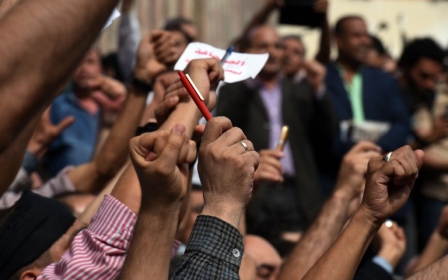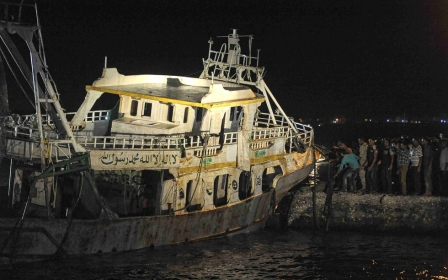Letter to my father: Egypt, a year in review
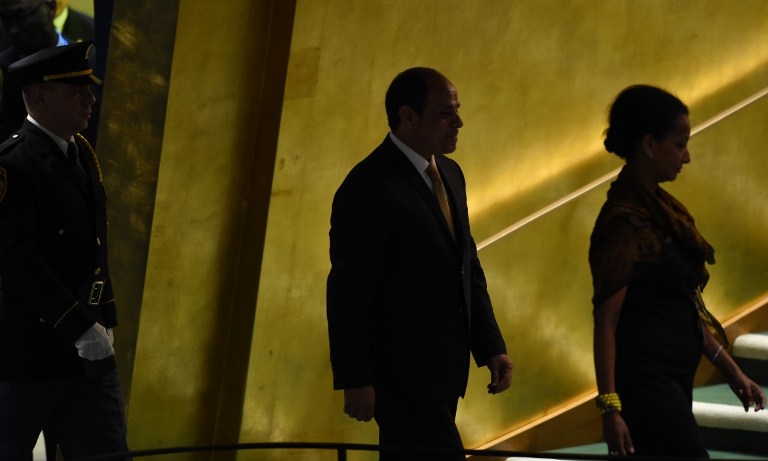
As I look back over 2016, I see two tears rolling down your cheeks, father: one because you left us for a better world, and another because the Egypt you knew is no more. The country you envisioned, as both journalist and citizen, would shed a tear for itself.
In a year that commenced with the murder of an Italian researcher and ended with the bombing of a church killing 27, Sisi, who knows only the army way, continued to pulverise Egyptians into submission.
It is no coincidence, father: where this man goes so does blood. It has been a dark journey filled with one wave of failure after another, be it governance, security, the economy, health or education.
If this annual boat-ride down the Nile had a soundtrack, it would be the mournful ballad by Om Kalthoum "to patience there is a limit".
Flying on auto-pilot
To best capture the past year, think of an aviator who believes that operating on auto pilot is all that is required to fly. To be clear, the fault lies not only with the pilot but also with all who tend to the Egyptian plane, from cleaning crews to assistant pilots.
That IS could strike a civilian target in the heart of Cairo in broad daylight should deeply worry all political camps
The grains of this quicksand are a combination of economic mismanagement, the military complex’s mistrust of all that is civilian and the political hegemony of the governing elites, topped by an unrivalled predilection to corruption and an inability to provide security.
What happens when a government marries the worst of an Islamist autocracy - and here I refer to Sisi's inner Salafi, a current that runs through the upper reaches of the country's military complex - to a military dictatorship? Look at 2016.
The year began with terrorists stabbing three tourists in a Hurghada hotel in January. Coming on the heels of the Russian Metrojet airliner explosion only weeks earlier, this was a telling continuation of a pattern of successful terror operations and systematic security failure.
These attempts, claimed by Lewaa al Thawara (Revolution Brigade) and Hasm, are significant because these groups are not part of the Islamic State (IS) dynamic, but instead are local outgrowths that emerged in reaction to local factors.
Anyone who says that Egypt is largely secure with the exception of Sinai is living in a mirage
Rather than provide a security solution, the Egyptian regime is manufacturing its own terrorism. With youth unemployment one of the highest in the world at 42 percent, political avenues closed by a regime that maintains a vice-like grip on its parliament through its various security branches, and an unparalleled economic crisis, is it any wonder that terror organisations flourish within Egyptian borders?
Perhaps most disturbingly, 2016 ended with a potentially catastrophic development: the bombing of the Abassiya cathedral which left 27 dead.
MORE: Egypt's church bomb and the monsters in Sisi's closet
That IS, which claimed the attack, could strike a civilian target in the heart of Cairo in broad daylight should deeply worry all political camps and could portend an even more deadly 2017 for a Sisi regime “at its most vulnerable”, according to an Israeli analyst just this past week.
Anyone who says that Egypt is largely secure with the exception of Sinai, where an insurgency has raged since the coup in 2013, is living in a mirage. Even there, the daily bloodbath continues unabated with the last major attack killing 12 soldiers only weeks ago.
Economy on life support
But security failures, while destabilising and an extremely expensive problem in terms of lost tourism, are a symptom rather than the crux of the national problem itself.
You see, Baba (father in Arabic), it became crystal clear this year that the Egyptian leader is far more concerned with his neo-Salafist flourishes than he is with the intricacies of an economy that may choke Egyptian progress for decades to come.
Having previously turned down an assignment as military attaché to the US as a result of the Egyptian government’s insistence that his wife remove her hijab, an inexperienced Sisi had far more complex issues to tackle in 2016.
But as the term lifeline implies, you are closer to death than life and, rather than saviour, the IMF conditions may prove to be a political death knell. Devaluation of the pound, energy subsidy reduction, and introduction of value-added tax while freezing government salaries together present a massive challenge to a stable regime, let alone the stumbling Sisi operation.
In simple terms, to garner $12bn from the IMF - many billions of which will be channeled to pay off the country’s foreign debt - the Egyptian autocrat took steps this year which have already raised prices by more than 30 percent in many cases and can only raise the prospects of social unrest.
MORE: 'They started to die together': Can Egypt protect migrants in 2017?
The degree to which this unrest presents itself in 2017 as a direct consequence of this marriage will determine whether Sisi's regime can survive the year ahead. Inflation has already risen 19.4 percent year on year in November, while food and beverage prices soared 21.5 percent, figures that could very well be a harbinger of uprisings.
Echoing in ears, shutting mouths
Further darkening 2016 was the continued assault on human rights, freedom of speech, NGOs and civil society at large. This is a government that only wants its voice echoed in Egyptian ears and has moved to shut all other mouths using laws or even pushing outside the legal realm.
Try to effect social change or report in Egypt in 2017, and plan on joining the journalists and civil society leaders already behind bars
With a parliament only functioning as a facade, civil society’s candle extinguished by a government with a strong distaste for checks and balances and an Egypt as the third biggest jailer of journalists in the world, discourse is but a figment of the imagination in Egypt.
Indeed, 2016 saw security forces invade the Journalists Syndicate and Yehia Qalash, head of the journalists’ union, sentenced to two years in prison for "harbouring two wanted journalists". Journalists, for the most part, are for “decoration” as one Al Masry Youm journalist told the New Yorker.
In other words, try to effect social change or report events in Egypt in 2017, and expect to join journalists and civil society leaders already behind bars.
Island unto himself
No look at 2016 would be complete without peering at the transfer of the Red Sea Islands, Tiran and Sanfir, and what it revealed. More than the mere surrender of Egyptian land, in and of itself an act of high treason, it showed a condescending Sisi with little to no respect for Egyptian public opinion.
Rather than open a national discussion about an issue which the government should have understood could cause deep public anger, Egyptians were, instead, presented with a fait accompli. The most significant demonstrations during the Sisi era followed on 15 April and the government responded in the only way it knows: quashing of dissent through arrests before planned protests on 25 April.
The delay in handover of the islands, combined with disagreements on Syria and Yemen, are among a myriad of factors that have devastated the all-important Saudi-Egyptian relations. So far, all attempts to mediate between the two have failed, as Alain Gresh of Le Monde recently wrote.
The winds of logic
Sisi showed a contradictory penchant for honesty and lies this year and, funnily enough, managed to lose in both situations.
When the impossible is uttered as reality and lies are muttered as truth, how can the people trust?
When a president of a major nation twice asserts that he “stayed for ten years with the fridge only containing water…ten years and my fridge contained water only!”, how can he win? When the impossible is uttered as reality and lies are muttered as truth, how can the people trust him?
Certain truths uttered by Sisi do more damage than his lies, as when he recently described the Egyptian police as a "million-man mafia" to a US State Department official. To hear a president admit that he cannot control the same police that took a large part of the blame for Mubarak’s fall is deeply disturbing - a description used far too often this past year.
Though heartbroken at your departure father, I am deeply grateful that you didn’t have to witness much of 2016. All signs point to a 2017 that will keep analysts of all stripes busy. For the sake of a people who deserve far better, let us hope the winds of logic blow over the presidential palace - or wherever Sisi sleeps these days.
- Amr Khalifa is a freelance journalist and analyst recently published in Ahram Online, Mada Masr, The New Arab, Muftah and Daily News Egypt. You can follow him on Twitter@cairo67unedited.
The views expressed in this article belong to the author and do not necessarily reflect the editorial policy of Middle East Eye.
Photo: Egypt’s President Abdel Fattah Al Sisi arrives to address the 71st session of the United Nations General Assembly at the UN headquarters in New York on 20 September 2016 (AFP)
New MEE newsletter: Jerusalem Dispatch
Sign up to get the latest insights and analysis on Israel-Palestine, alongside Turkey Unpacked and other MEE newsletters
Middle East Eye delivers independent and unrivalled coverage and analysis of the Middle East, North Africa and beyond. To learn more about republishing this content and the associated fees, please fill out this form. More about MEE can be found here.



